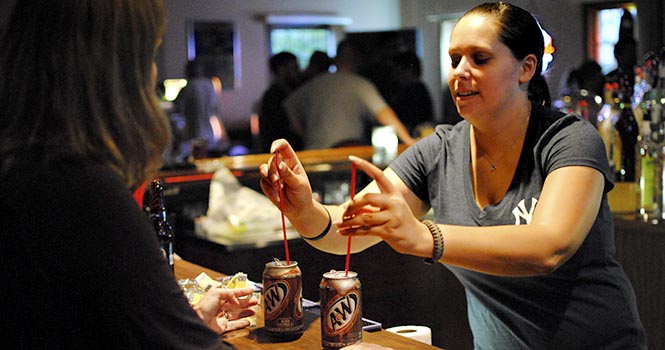Female veterans embrace close-knit community at Kent State
Cat Hofer, president of the KSU Veterans Club, serves drinks to fellow members during the club’s weekly business meeting on Tuesday, September 4 at the Kent VFW. Hofer takes online classes at Kent State, and has been president of the club for one year. Hofer will soon be handing the position to another member in order to train for her April deployment to Afghanistan. Hofer, being one of several women present at the meeting, joked that the KSU Vets is a “men’s club,” before expressing great appreciation and love for her association with the club. Photo by Jenna Watson.
September 17, 2012
When Catherine Hofer, a 30-year-old senior pre-nursing major, returned home after serving in Afghanistan for nine months, she felt as if she didn’t have a place where she belonged.
As a female veteran, she knew she wasn’t respected in the community as much as her male counterparts. In fact, she was so exhausted by her seemingly hopeless quest to find others who could identify with her unique struggles that she was considering transferring out of Kent State altogether.
When she was introduced to the KSU Veteran’s Club, however, she was able to fully appreciate the university that had previously left her so fragmentary.
Among the hundreds of U.S. veterans currently enrolled at Kent State, there are dozens of women who have faced gender-related discrimination during their time in the military or thereafter. But through the Kent State Veterans Club and the Center for Adult and Veteran Services, the women have established a community that is “like a family” to ease the struggles that are not only exclusively related to female veterans but to veterans at large.
Jennifer Tomlin, a 42-year-old senior psychology major, served as an army truck driver and company secretary in Korea in the early 1990s.
“It is very difficult for females in the military,” Tomlin said. “Especially in the early ‘90s when we were still trying to establish ourselves in our positions in the military. I had a sergeant who desperately tried to push me out because I was pregnant.”
She attributed much of the discrimination and negativity she experienced in the Army to the sociological stigma at the time.
“The mentality of women in combat was that women were the weaker sex,” Tomlin said. “It was because women [were considered] more emotional and more nurturing. That’s a battle that women have had all along.”
Hofer served in Afghanistan in 2008 and said that her experience with discrimination was more prominent upon returning home.
“When I go to the (hospital) to get treated for any medical issues I have from serving overseas, I get treated very differently than a male would with the same problem,” Hofer said. “I think they look at females like they haven’t been in combat and can’t have the same issues that their male counterparts have.”
Tomlin said that without resources such as the Kent State Veterans Club and other veterans services on campus, she doesn’t believe she would have realized her full potential.
“The staff, the people, they’re very warm and welcoming,” Tomlin said. “They’ll help with anything, all the way down to scheduling problems, financial aid problems. It’s a sense of family; You’re always welcome as an adult, non-traditional student. They’ve been wonderful.”
Hofer, who is president of the Veterans Club, credits the organization with her very existence at Kent State.
“The Veterans Club actually kept me at Kent State. I was ready to drop out … they became my family, they became my niche.”
Angela Miller, a 35-year-old senior psychology major, served in the U.S. Navy from 1998 to 2002 and felt as if she had to work harder than most of her male equivalents to receive the same level of respect. She said that without the KSU Veterans Club, she wouldn’t feel a sense of inclusiveness at Kent State.
“Once you’re in the military you kind of learn to adopt your fellow military members as family,” Miller said. “It’s a common bond that links you.”
Contact Christina Suttles at [email protected].












